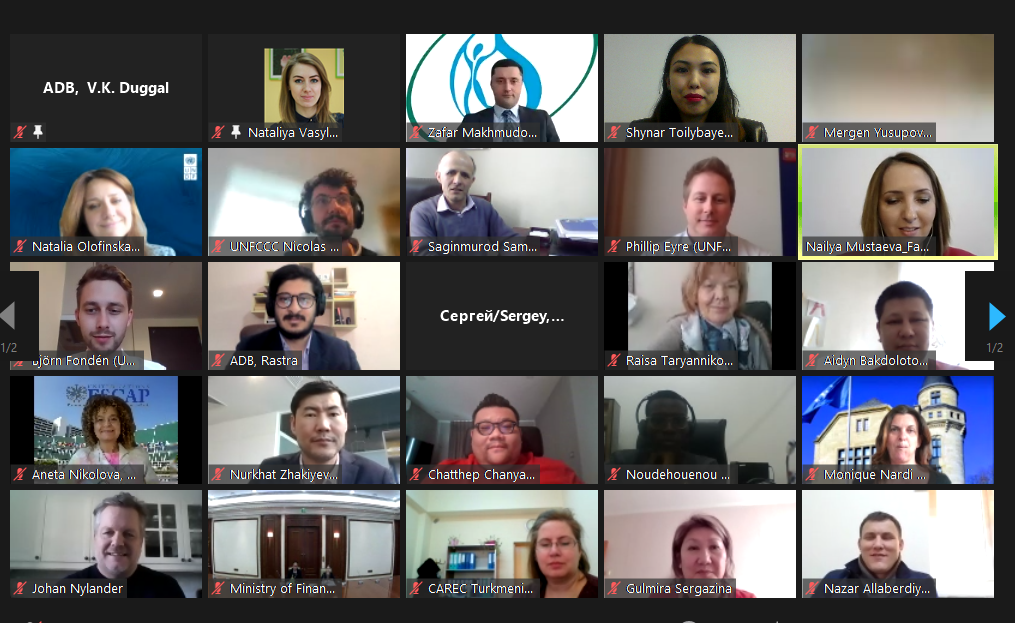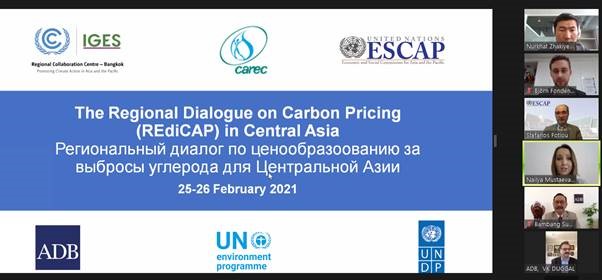
The Regional Dialogue on Carbon Pricing (REdiCAP) was organized for the five Central Asia countries (Kazakhstan, Kyrgyzstan, Tajikistan, Turkmenistan and Uzbekistan) on 25-26 February 2021. This Central Asia REdiCAP followed five successful regional dialogues on carbon pricing organized last year. The dialogues aim to:
• Provide Parties at different stages of adopting national and regional carbon pricing instruments (CPI) an opportunity to find out more about the benefits, challenges, tools and best practices directly from those doing the implementation;
• Foster emulation between Parties currently considering or formulating carbon pricing policies and those that have not yet taken this step; and
• Provide updates about ongoing developments and safe space to share challenges and identify potential solutions.
For the Central Asia REdiCAP, representatives came together for two days of dialogue to discuss the challenges and opportunities relating to carbon pricing in their countries and how regional collaboration can support their climate mitigation efforts.
The REdiCAP opened with high-level welcoming remarks from James Grabert, the Director of the Mitigation Division at UNFCCC, and Stefanos Fotiou, Director of the Environment and Development Division, ESCAP. They were followed by a keynote speech from Dr. Bambang Susantono, the Vice President for Knowledge Management and Sustainable Development at the Asian Development Bank.

The regional Technical Expert recruited through a collaboration with the Regional Environmental Centre for Central Asia (CAREC) presented an overview of the current status of CPI in Central Asia and CAREC Executive Director, Mr. Zafar Makhmudov recommendations from a pre-study undertaken ahead of the REdiCAP. This was followed by short presentations from each country – sharing their experiences, identifying opportunities and outlining challenges of working on carbon pricing. Dr. Irfan Tariq, Director General of the MoCC in Pakistan, presented lessons learned from the consideration of a domestic emission trading system (ETS) in Pakistan, supported by the UNFCCC under the CiACA initiative.
Participants highlighted barriers to implementing a carbon price in their countries, including low institutional capacity, low priority by political actors and potential for price increases that may impact vulnerable communities. Today, Kazakhstan is the only country in the region with a CPI, in the form of an Emissions Trading System (ETS). The group also highlighted the lack of Russian language information on CPI, which makes it more difficult to build local capacity.
On the second day, participants listened to technical presentations by the Asian Development Bank (ADB) and UNFCCC before going into roundtable discussions about the path to adopt CPI in Central Asia. Finally, a roadmap of proposed activities was compiled, which will be presented with the REdiCAP final report in a few weeks. The dialogue was further a great example of interagency collaboration, bringing together ESCAP, UNDP, UNEP and the ADB. The Regional Environmental Centre for Central Asia (CAREC) supported the dialogue as technical partner.
The dialogue was organized in a virtual, bilingual setting, with simultaneous interpretation between English and Russian.
